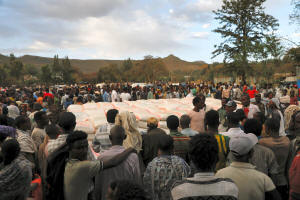U.N. condemns Ethiopia expulsions, says 5.2 million need aid in Tigray
 Send a link to a friend
Send a link to a friend
 [October 01, 2021]
By Stephanie Nebehay [October 01, 2021]
By Stephanie Nebehay
GENEVA (Reuters) -The United Nations on
Friday condemned Ethiopia's announcement that it was expelling seven
senior U.N. officials, and voiced concern for 5.2 million people in the
Tigray region who are in need of urgent assistance as malnutrition
rises.
The expulsions were announced late on Thursday, two days after the U.N.
aid chief warned that a government aid blockade had likely forced
hundreds of thousands of people in Tigray into famine.
"It is critically important that the humanitarian operation continues -
and it does," Jens Laerke, spokesman for the U.N. Office for the
Coordination of Humanitarian Affairs (OCHA), told a Geneva briefing.
"Until now there is no indication that it (Ethiopia's decision) stops
the operation."

International condemnation of the humanitarian situation in the northern
Ethiopia has been growing. The United States threatened sanctions
against any party obstructing aid to Tigray, which has been mired in
conflict for nearly 11 months.
Ethiopia's Ministry of Foreign Affairs did not respond to requests for
comment on the expulsions. Ethiopia has previously denied blocking food
aid.
U.N. human rights spokesman Rupert Colville said the plan to expel the
head of its reporting team in Ethiopia was a "really grave step",
adding: "The scale, seven people across three agencies, is extremely
rare, if not unprecedented."
[to top of second column]
|

People stand in line to receive food donations, at the Tsehaye
primary school, which was turned into a temporary shelter for people
displaced by conflict, in the town of Shire, Tigray region,
Ethiopia, March 15, 2021. REUTERS/Baz Ratner

"We are pretty much united across the U.N. that this
is not an acceptable situation," said Colville.
The world body hopes the decision will be changed or reviewed, said
Laerke.
"It is critically important that the humanitarian operation
continues."
The current situation is critical, Laerke said, noting that 79% of
pregnant and lactating women screened in Tigray last week were
diagnosed with acute malnutrition. Only about 11% of the trucks
needed to bring life-saving food have entered Tigray since mid-July,
said Laerke.
The conflict's spillover to neighbouring Amhara and Afar regions
means humanitarian needs and displacement are rising.

(Writing by Ayenat Mersie; Editing by Kevin Liffey and Giles Elgood)
[© 2021 Thomson Reuters. All rights
reserved.] Copyright 2021 Reuters. All rights reserved. This material may not be published,
broadcast, rewritten or redistributed.
Thompson Reuters is solely responsible for this content. |